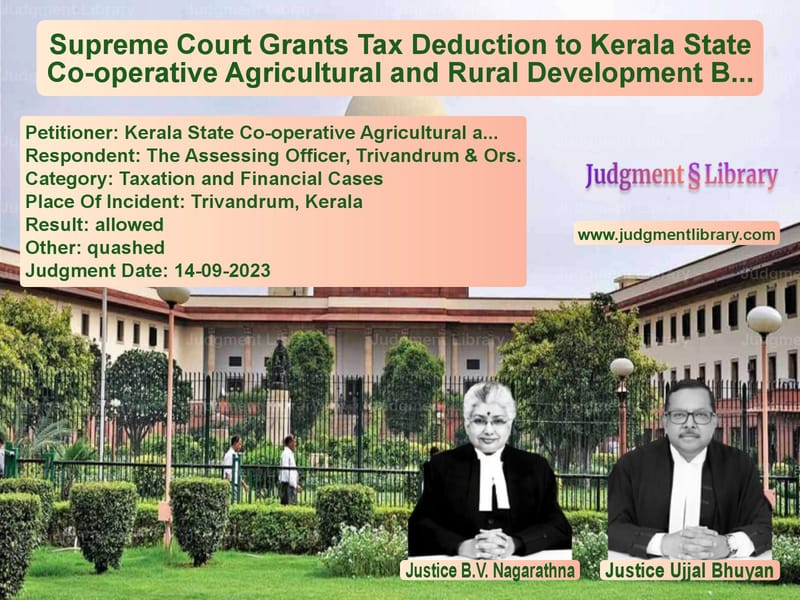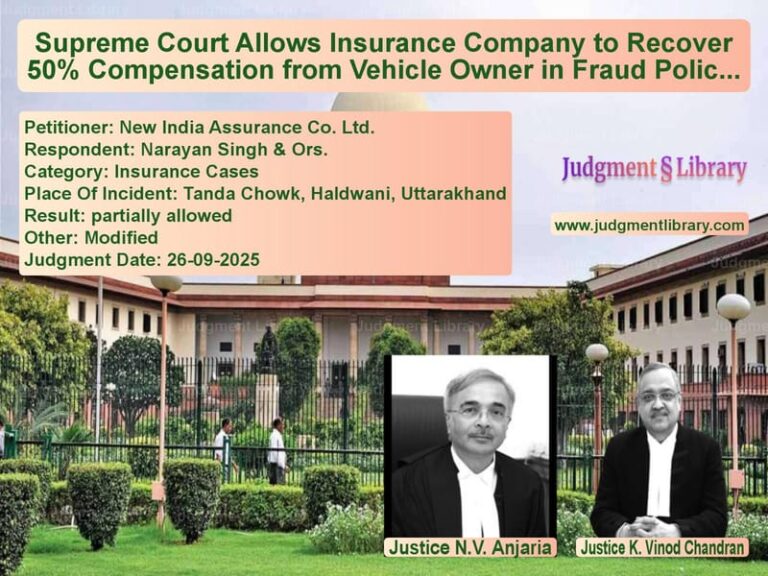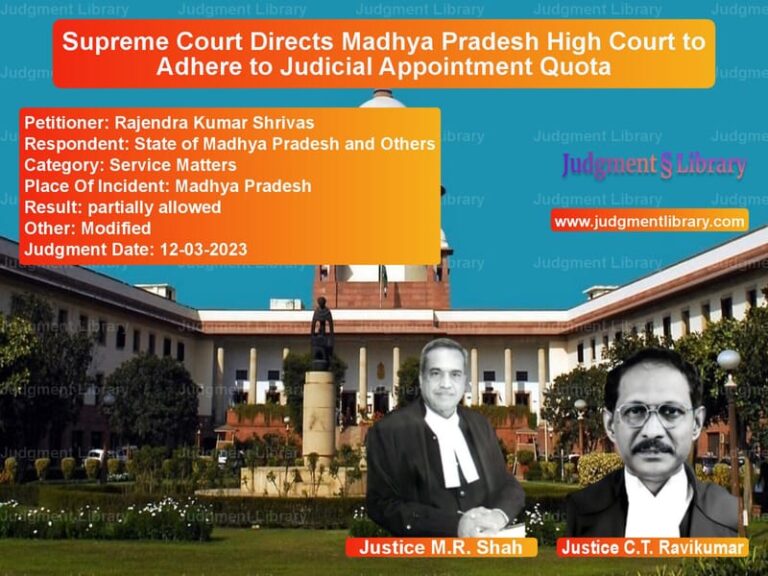Supreme Court Grants Tax Deduction to Kerala State Co-operative Agricultural and Rural Development Bank
The Supreme Court of India has ruled in favor of the Kerala State Co-operative Agricultural and Rural Development Bank Ltd. (KSCARDB), allowing it to claim tax deduction under Section 80P of the Income Tax Act, 1961. The decision overturns previous rulings by the Kerala High Court and the Income Tax Appellate Tribunal (ITAT) and clarifies the tax treatment of cooperative banks versus cooperative credit societies.
Background of the Case
The case involved a dispute over whether KSCARDB was entitled to claim a full deduction on its profits under Section 80P(2)(a)(i) of the Income Tax Act, which provides tax benefits to cooperative societies engaged in banking or providing credit facilities to their members. The dispute arose after the Assessing Officer (AO) and the Kerala High Court ruled that KSCARDB was a ‘cooperative bank’ and therefore ineligible for the deduction due to the exclusion in Section 80P(4).
The appeals were filed against:
- A judgment by the Kerala High Court dated 26 November 2015.
- An order by the Commissioner of Income Tax (Appeals), Trivandrum, dated 8 August 2016.
- A ruling by the Income Tax Appellate Tribunal (ITAT) dated 7 February 2019.
Legal Issues Raised
The case centered on the following legal questions:
- Is KSCARDB a ‘cooperative bank’ under Section 80P(4) or a ‘cooperative society’ eligible for tax deductions under Section 80P(2)?
- Does the decision in Mavilayi Service Co-operative Bank Ltd. vs. Commissioner of Income Tax (2021) apply to this case?
- Should the bank be entitled to tax deductions under Section 80P?
Petitioner’s Arguments (KSCARDB)
Senior advocate Krishnan Venugopal argued on behalf of KSCARDB, stating:
- KSCARDB is a cooperative society, not a cooperative bank, as it provides credit exclusively to its members, who are other cooperative societies.
- The bank was initially registered under the Travancore-Cochin Cooperative Societies Act, 1951 and later under the Kerala Cooperative Societies Act, 1969, making it an apex cooperative society.
- Under the Banking Regulation Act, 1949 (BR Act), a cooperative bank must hold a banking license from the Reserve Bank of India (RBI), which KSCARDB does not have.
- The bank’s operations do not include accepting public deposits, a key requirement for being classified as a bank.
- Under the National Bank for Agriculture and Rural Development Act, 1981 (NABARD Act), the bank is classified as a cooperative credit institution, not a banking institution.
- The High Court misapplied the law by treating KSCARDB as a cooperative bank.
Respondent’s Arguments (Income Tax Department)
Additional Solicitor General N. Venkataraman represented the Income Tax Department, arguing:
- KSCARDB performs banking functions and meets the criteria of a cooperative bank.
- The bank provides credit and financial services similar to a bank, making it ineligible for tax benefits under Section 80P.
- Other cooperative banks have been denied the same deduction, ensuring fairness in taxation.
- The High Court and ITAT correctly determined that KSCARDB fell within the scope of Section 80P(4).
Supreme Court’s Observations
A bench comprising Justices B.V. Nagarathna and Ujjal Bhuyan ruled in favor of KSCARDB. The Court made the following key observations:
1. Distinction Between Cooperative Banks and Credit Societies
The Court clarified that a cooperative society must meet the definition of a cooperative bank under the Banking Regulation Act, 1949 to fall within the exclusion under Section 80P(4). Since KSCARDB does not accept public deposits and is not licensed by RBI, it does not qualify as a cooperative bank.
2. Applicability of Mavilayi Service Co-operative Bank Judgment
The Court relied on its ruling in Mavilayi Service Co-operative Bank (2021), which held that primary cooperative societies are eligible for deductions under Section 80P as long as they do not function as banks. Since KSCARDB lends only to cooperative societies and not the public, it qualifies for the deduction.
3. Interpretation of Section 80P(4)
The Court ruled that the exclusion in Section 80P(4) applies only to cooperative banks engaged in public banking operations. Since KSCARDB does not engage in such activities, it is entitled to the deduction.
4. Overreach by Income Tax Authorities
The Court criticized the tax authorities for misclassifying KSCARDB as a cooperative bank, noting:
“The appellant is a cooperative credit society under Section 80P(2)(a)(i) whose primary object is to provide financial accommodation to its members, who are all other cooperative societies and not members of the public.”
Final Verdict
The Supreme Court ruled:
- The Kerala High Court’s judgment dated 26 November 2015 was set aside.
- KSCARDB is not a cooperative bank under Section 80P(4) and is entitled to a full tax deduction.
- The Commissioner of Income Tax’s order dated 8 August 2016 and the ITAT’s ruling of 7 February 2019 were overturned.
- The appeals were allowed with no costs imposed on either party.
Implications of the Judgment
This ruling has significant implications for cooperative credit societies across India:
- Clarifies Taxation of Cooperative Societies: Societies lending exclusively to other cooperatives remain eligible for Section 80P deductions.
- Prevents Tax Misclassification: Ensures that tax authorities do not misclassify cooperative societies as cooperative banks.
- Supports the Cooperative Movement: Encourages agricultural and rural credit institutions by preserving tax benefits.
- Limits Arbitrary Taxation: Reinforces that cooperative banks must have public banking operations to be excluded from Section 80P.
Conclusion
The Supreme Court’s decision in KSCARDB vs. Assessing Officer, Trivandrum is a landmark ruling that upholds the taxation rights of cooperative societies. It reinforces the principle that cooperative societies providing credit exclusively to members cannot be denied tax benefits under Section 80P.
This ruling is expected to benefit thousands of cooperative societies across India, ensuring their continued financial viability while maintaining their distinct status from commercial banks.
Petitioner Name: Kerala State Co-operative Agricultural and Rural Development Bank Ltd..Respondent Name: The Assessing Officer, Trivandrum & Ors..Judgment By: Justice B.V. Nagarathna, Justice Ujjal Bhuyan.Place Of Incident: Trivandrum, Kerala.Judgment Date: 14-09-2023.
Don’t miss out on the full details! Download the complete judgment in PDF format below and gain valuable insights instantly!
Download Judgment: kerala-state-co-oper-vs-the-assessing-office-supreme-court-of-india-judgment-dated-14-09-2023.pdf
Directly Download Judgment: Directly download this Judgment
See all petitions in Income Tax Disputes
See all petitions in Tax Refund Disputes
See all petitions in Banking Regulations
See all petitions in Judgment by B.V. Nagarathna
See all petitions in Judgment by Ujjal Bhuyan
See all petitions in allowed
See all petitions in Quashed
See all petitions in supreme court of India judgments September 2023
See all petitions in 2023 judgments
See all posts in Taxation and Financial Cases Category
See all allowed petitions in Taxation and Financial Cases Category
See all Dismissed petitions in Taxation and Financial Cases Category
See all partially allowed petitions in Taxation and Financial Cases Category







